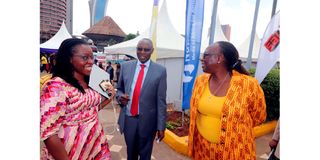From law to the corporate world, this is Phyllis Wakiaga

Phyllis Wakiaga is the CEO of Kenya Association of Manufacturers (KAM).
What you need to know:
- It is now close to seven years since Phyllis Wakiaga took over the leadership of KAM.
- With the launch of Women in Manufacturing (WiM) program in 2017, business court user committees, uKAMilifu and sustainability initiatives, she counts as one of the women in Kenya driving inclusivity and diversity in the manufacturing sector.
- Ms Wakiaga is a trained lawyer whose heart was always in the corporate world.
I meet Phyllis Wakiaga on a Tuesday a few minutes past noon. She has just returned from a benchmark tour for Small and Medium Enterprises (SMEs) at Bio Food Products in Industrial Area, Nairobi County.
She has another engagement in an hour’s time-that gives a sneak preview of how the day goes in the work-life of the chief executive officer of the Kenya Association of Manufacturers (KAM).
KAM is a business membership organisation whose mission is primarily to create a conducive environment in the country and regionally for enterprises to thrive.
It is now close to seven years since she took over the leadership of KAM from Betty Maina, the current Cabinet Secretary for Industrialisation, Trade and Enterprise Development.
SDGs
Her tenure has been marked with exemplary achievements that to a great extent, promote attainment of Sustainable Development Goals (SDGs) targets one (no poverty), five (gender equality), nine (industry, innovation and infrastructure), 10 (reduced inequalities) and 12 (responsible consumption and production) of the Sustainable Development Goals.
With the launch of Women in Manufacturing (WiM) program in 2017, business court user committees, uKAMilifu and sustainability initiatives, Wakiaga counts as one of the women in Kenya driving inclusivity and diversity in the manufacturing sector but also promoting protection of the environment from plastic pollution.
“I am very proud of the WiM program because through it we have enhanced participation of women in the manufacturing sector,” she says.
They have done so through encouraging women to invest in the sector, pushing for more women to take up leadership positions in the sector, and encouraging others to study science, technology, mathematics and engineering courses to be able to work in the field.

Phyllis Wakiaga (left) with her predecessor Betty Maina (right) the Industrialization, Trade and Enterprise Development CS during the 1st edition of the Meat Expo and Conference at the KICC on November 19, 2021. Looking on is Johnson Weru, the PS Trade and Enterprise Development.
“As they work, they gain technical skills, which they will translate to SMEs, a gateway to more job opportunities,” she says.
“We have seen that happening in the past decade and it is very encouraging that women are getting into these spaces,” she indicates.
From the numerous dialogues she held with the Judiciary and National Council on Administration of Justice, came to be business court user committees, which she says facilitates faster access to justice for the business community.
Last September, KAM launched uKAMilifu initiative through which it will work with its current industry stakeholders to impact a wide spectrum of human development areas, to alleviate poverty in Kenya.
In 2019, she led KAM into a partnership with Kenya Alliance of Resident Associations that yielded development of a model County Waste Management Policy and Bill to guide county governments in developing waste management policies. Mombasa, Kisumu and Nakuru have since adopted the model, a success to its sustainability initiative.
In the same year, she oversaw the launch of Kenya Plastic Action Plan, a private sector driven policy and action plan that aims at enabling a circular economy for environmentally sustainable use and recycling of plastics in Kenya.
Her presence is also felt at the regional and global level. For instance, she is the face of KAM negotiations in finding consensus on common external tariff (CET) across the six East Africa Community countries.
Imported goods
KAM holds that a low CET could otherwise kill the region’s industrial sector as this will open doors for flooding the EAC market with imported goods that can instead be manufactured locally.
But since 2015, the EAC members are yet to agree on a resolution on the tariff, a delay that Ms Wakiaga notes as one of challenges that characterise her work.
But all in all, partnerships, continuous dialogues and learning from industry stakeholders, especially the 18 KAM board members, Industrialisation CS Ms Maina, former KAM board chair Flora Mutahi and Kenya Electricity Generating Company managing director Rebecca Miano, have enabled her excel.
She chairs the board of Global Compact Network Kenya, a chapter that endeavours to mainstream principles of integrity, respect of human and labour rights, and protection of the environment from degradation among Kenyan businesses.
Covid-19 knocked the industry for a loop but it taught her something about business resilience.
“There was a time. last year that for almost four months I slept for three to four hours. We were trying to figure out how the sector would continue to operate,” she says.
“We designed protocols for factories and trained the members on them. We also did studies to establish the impact of Covid-19 on businesses.”
While at the same, they were helping the entrepreneurs to repurpose their businesses through acquisition of approvals from the relevant authorities.
By diversifying, the entrepreneurs were taking advantage of the opportunity that came about with the disruption in the global supply chain.
Trained lawyer
“A number of businesses, some run by women, were able to get into production of PPE (Personal protective equipment), hygiene and cosmetic products,” she says.
Her professional growth is admirable.
Ms Wakiaga is a trained lawyer whose heart was in the corporate world.
“I didn’t want to practice. I wanted to work in the corporate sector,” she says.
She got her first job in 2007 at the Customer Experience department at Kenya Airways where she was the legal focal point.
Here, she says she got a deeper understanding of the business environment. This experience made her get curious about business dynamics and with that she decided to do a Master’s degree in Business Administration at Jomo Kenyatta university of Agriculture and Technology.
After two years and six months, she was promoted to the manager, government and industry affairs, a department she says focused on economics and law, broadening her skillset on bilateral negotiations and business management.
In June 2013, she then joined KAM as head of policy, research and advocacy. In her capacity, she was keen on trade and investment, which prompted to go for a Master’s degree in International Trade and Investment Law at University of Nairobi.
To all the girls and women, she implores: “The sky is the limit because God creates all of us with a purpose in our hearts, and gives us the ability to fulfil that purpose. So, wherever you are, whatever you are doing, be the best at it.”





